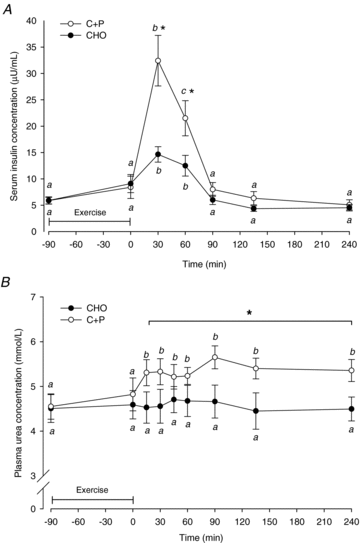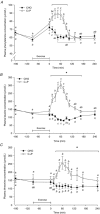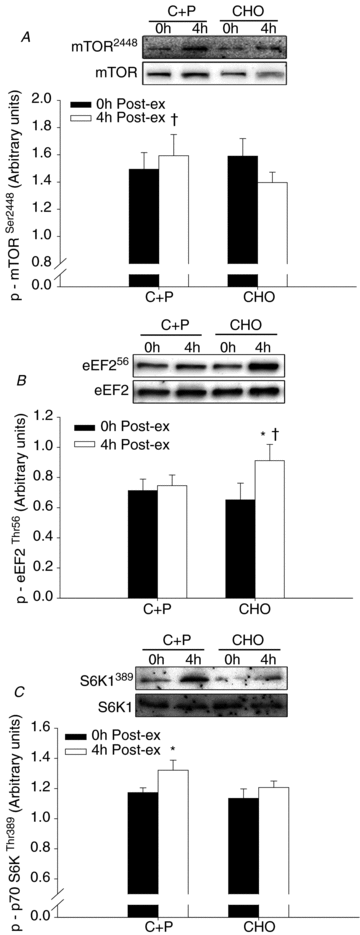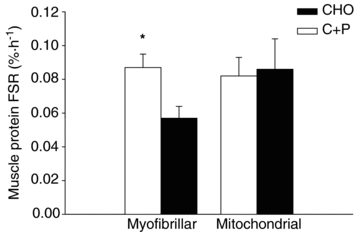The influence of carbohydrate-protein co-ingestion following endurance exercise on myofibrillar and mitochondrial protein synthesis
- PMID: 21746787
- PMCID: PMC3179999
- DOI: 10.1113/jphysiol.2011.211888
The influence of carbohydrate-protein co-ingestion following endurance exercise on myofibrillar and mitochondrial protein synthesis
Abstract
The aim of the present study was to determine mitochondrial and myofibrillar muscle protein synthesis (MPS) when carbohydrate (CHO) or carbohydrate plus protein (C+P) beverages were ingested following prolonged cycling exercise. The intracellular mechanisms thought to regulate MPS were also investigated. In a single-blind, cross-over study, 10 trained cyclists (age 29 ± 6 years, VO2max 66.5 ± 5.1 ml kg(−1) min(−1)) completed two trials in a randomized order. Subjects cycled for 90 min at 77 ± 1% VO2max before ingesting a CHO (25 g of carbohydrate) or C+P (25 g carbohydrate + 10 g whey protein) beverage immediately and 30 min post-exercise. A primed constant infusion of L-[ring-(13)C6]phenylalanine began 1.5 h prior to exercise and continued until 4 h post-exercise. Muscle biopsy samples were obtained to determine myofibrillar and mitochondrial MPS and the phosphorylation of intracellular signalling proteins. Arterialized blood samples were obtained throughout the protocol. Plasma amino acid and urea concentrations increased following ingestion of C+P only. Serum insulin concentration increased more for C+P than CHO. Myofibrillar MPS was ∼35% greater for C+P compared with CHO (0.087 ± 0.007 and 0.057 ± 0.006% h(−1), respectively; P = 0.025). Mitochondrial MPS rates were similar for C+P and CHO (0.082 ± 0.011 and 0.086 ± 0.018% h(−1), respectively). mTOR(Ser2448) phosphorylation was greater for C+P compared with CHO at 4 h post-exercise (P < 0.05). p70S6K(Thr389) phosphorylation increased at 4 h post-exercise for C+P (P < 0.05), whilst eEF2(Thr56) phosphorylation increased by ∼40% at 4 h post-exercise for CHO only (P < 0.01). The present study demonstrates that the ingestion of protein in addition to carbohydrate stimulates an increase in myofibrillar, but not mitochondrial, MPS following prolonged cycling. These data indicate that the increase in myofibrillar MPS for C+P could, potentially, be mediated through p70S6K, downstream of mTOR, which in turn may suppress the rise in eEF2 on translation elongation.
Figures






Comment in
-
Protein ingestion after endurance exercise: the 'evolving' needs of the mitochondria?J Physiol. 2012 Apr 15;590(8):1785-6. doi: 10.1113/jphysiol.2011.224188. J Physiol. 2012. PMID: 22532648 Free PMC article. No abstract available.
References
-
- Abumarad N, Rabin ND, Diamond MP. Use of a heated superficial hand vein as an alternative site for the measurement of amino acid concentrations and for the study of glucose and alanine kinetics in man. Metabolism. 1981;30:936–941. - PubMed
-
- Atherton PJ, Etheridge T, Watt PW, Wilkinson D, Selby A, Rankin D, Smith K, Rennie MJ. Muscle full effect after oral protein: time-dependent concordance and discordance between human muscle protein synthesis and mTORC1 signaling. Am J Clin Nutr. 2010;92:1080–1088. - PubMed
-
- Baumann PQ, Stirewalt WS, O'Rourke BD, Howard D, Nair KS. Precursor pools of protein synthesis: a stable isotope study in a swine model. Am J Physiol Endocrinol Metab. 1994;267:E203–E209. - PubMed
-
- Beelen M, Tieland M, Gijsen AP, Vandereyt H, Kies AK, Kuipers H, Saris WH, Koopman R, van Loon LJ. Coingestion of carbohydrate and protein hydrolysate stimulates muscle protein synthesis during exercise in young men, with no further increase during subsequent overnight recovery. J Nutr. 2008;138:2198–2204. - PubMed
Publication types
MeSH terms
Substances
LinkOut - more resources
Full Text Sources
Other Literature Sources
Medical
Miscellaneous

